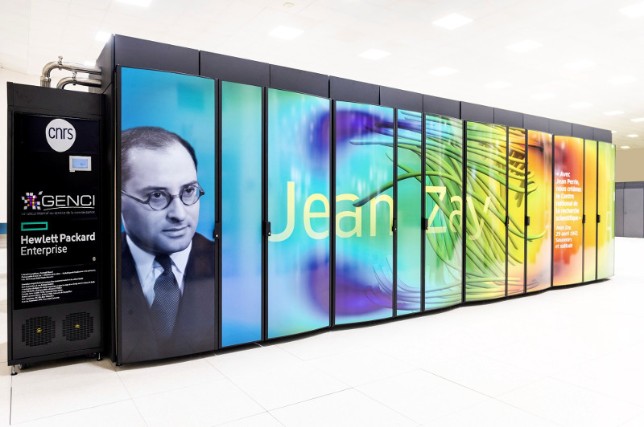ESPERANTO will contribute to the development of the next generation of AI; AI interacting with their users for better learning but also explainable systems: systems whose decisions are understandable by humans. In order to make these technologies accessible to the largest number of people, ESPERANTO will address applications with limited resources in the field of rare languages, robotics or education.
Among major events, the ESPERANTO consortium will co-organize JSALT workshops in collaboration with Johns Hopkins University. JSALT workshops consist of 2 weeks of summer school followed by 6 weeks of teamwork on a research topic chosen by the organizers and funded by major American companies. For the second time in 25 years, this key event in the field of Artificial Intelligence will take place outside the American continent and JSALT 2023 will bring 4 teams of international researchers to Le Mans.

From September 18, 2024 to December 18, 2024
WP4: Explainability,
Ana Montalvo from CENATAV (La Havana, Cuba) is hosted by LIA (Avignon, France) for a 3 month-period.

From November 1, 2024 to November 30, 2024
WP2: Working with low resources
José Ramón Calvo from CENATAV (Cuba) is hosted by UNIZAR (Spain) for a 1 month-period.

From September 18, 2024 to December 14, 2024
WP5: Evaluating intelligent systems, WP6: Community fostering
Heydi Mendez Vazquez from CENATAV (Cuba) is hosted by LMU (France) for a 3 month-period.

From April 6, 2024 to July 5, 2024
WP2: Working with low resources, WP4: Explainability
Martin Atangana and Yannick Yomie visiting from UY1 (Cameroon) are hosted by LMU (France) for a 3 month-period.

From January 14, 2024 to April 12, 2024
WP2: Working with low resources
Flavio Jorge REYES DIAZ from CENATAV (Cuba) is hosted by UNIZAR (Spain) for a 3 month-period.

From September 1, 2023 to November 6, 2023
WP2: Working with low resources
WP4: Explainability
Cyntia Bonomi and Mariel Esteve from CONICET (Argentina) will be working in Zaragoza alongside researchers from VivoLab from September 1st to November 6th, 2023.

From August 3, 2023 to November 24, 2023
WP6: Community fostering
WP4: Explainability
Martin Bernardo Meza and Lautaro Estienne from CONICET (Argentina) are hosted by UPGM FIT VUT Brno (Czech Republic) for a 3 month-period.

The August 1, 2023
Victoria Mingote : “Representation and Metric Learning Advances for Face and Speaker Biometric Systems”
Pablo Gimeno: “Multiclass audio segmentation in broadcast environments”

From May 17, 2023 to August 15, 2023
WP6: Community fostering
Leonardo Pepino and German Bachi from CONICET (Argentina) are hosted by UPGM FIT VUT Brno (Czech Republic) for a 3 month-period.

From May 15, 2023 to August 5, 2023
WP4: Explainability
Fethi Bougares from Elyadata (Tunisia), Gabriel Hernandez from CENATAV (Cuba) and Lara Gauder from CONICET (Argentina) are hosted by Le Mans Université (France) for 2or 3 month-periods, including JSALT workshop.

From March 12, 2023 to June 12, 2023
WP4: Explainability
Jazmín Vidal from CONICET (Argentina) is hosted by Universidad de Zaragoza (Spain) for a 3 month-period.

From December 12, 2022 to April 19, 2023
WP2: Working with low resources
Yannick Yomie Nzeuhang from University of Yaounde (Cameroon) is hosted by Université Grenoble Alpes (France) for a 4 month-period.

From October 29, 2022 to January 11, 2023
WP2: Working with low resources
Federico Landini from Brno University of Technology (Czechia) is hosted by CONICET (Argentina) for a 2,5 month-period.

From December 12, 2022 to April 19, 2023
WP2: Working with low resources
Martin Rodrigue Atangana Ongolo from University of Yaounde (Cameroon) is hosted by Université Grenoble Alpes (France) for a 4 month-period.

From August 3, 2023 to August 4, 2023
This summer, for 6 weeks, the ESPERANTO projects brought together in Le Mans 32 researchers from 10 countries to work on explainability for diarization and on Automatic design for conversationa models.

The July 18, 2023
Petr Schwarz: “Introduction to speaker identification and deep fake context.”
Themos Stafylakis: “Extracting speaker and emotion information from self-supervised speech models.”

The March 28, 2023
Martin Rodrigue Atangana Ongolo and Yannick Yomie Nzeuhang, PhD students at at the University of Yaoundé 1 and currently in secondment at the University of Grenoble Alpes, present their work.

From December 16, 2022 to December 18, 2022
A team from the ESPERANTO consortium joined the JSALT team to select and refine the research topics that will be addressed next summer in Le Mans.
_max100x100.png?objectId=defaultWebContent://36e17694-6d7a-4afd-8d51-6da8430d7dab)
The July 13, 2022
For the second week of the JSALT 2022 Workshop, the Esperanto team has presented the on-going work during the plenary session with other teams on July, Wednesday 13.
_max100x100.png?objectId=defaultWebContent://24df917a-e9ab-4029-bd80-652fc8fcd807)
The July 6, 2022
For the first week of the JSALT 2022 Workshop, the Esperanto team has presented the on-going work during the plenary session with other teams on July, Wednesday 6.
_max100x100.png?objectId=defaultWebContent://d32908da-b7fe-418d-878a-0240bca52250)
The June 27, 2022
During the kick off meeting of the JSALT2022 workshop the ESPERANTO team described the goal of its research for the coming 6 weeks.

From June 27, 2022 to August 7, 2022
WP2: Working with low resources, WP6: Fostering community
Monday, 27th of June is the kick of session of the JSALT 2022 workshop in Baltimore !

From June 13, 2022 to August 7, 2022
WP2: Working with low resources, WP6: Fostering community
The first group of ESPERANTO team to JSalt has arrived at JHU, Baltimore, and started to follow the intensive two-week summer school of the Center for Language and Speech Processing

From May 1, 2022 to July 31, 2022
WP2: Working with low resources
Gabriel HERNANDEZ SIERRA and Flavio Jorge REYES DIAZ from CENATAV (Cuba) are hosted by UNIZAR (Spain) for a 3 month-period.

From March 28, 2022 to June 30, 2022
WP4: Explainability
Germes Bengono Obiang, PhD student from Université de Yaounde 1 (Cameroon) is hosted by Avignon Université (France) for a 3 month period.

From April 11, 2022 to April 12, 2022
ESPERANTO team members gathered in Le Mans to work on their JSALT project.

The March 18, 2022
Theo Mariotte, PhD student at Le Mans Université, will present his work related to explainability at Telecom Paris, in the adasp group .

The September 30, 2022
ESPERANTO project was presented during the 2022 edition of European Night of Researchers

The March 16, 2022
Dr Themos Stafylakis, Head of Machine Learning and Voice Biometrics, Omilia – Conversational Intelligence is invited speaker for the monthly business talks titled AI Industry Connect Talks.

From January 1, 2022 to December 31, 2025
Horizon Europe has launched its Marie Skłodowska-Curie Actions Staff Exchanges.
Find out how it works and download the new flyer.

From November 16, 2021 to November 19, 2021
Anthony Larcher presented ESPERANTO project to Science & You, an international science culture event addressed to professionals (researchers, PhD students, heads of museums and science centers, science communicators and journalists...), and open to the general public.

From November 18, 2021 to December 6, 2021
WP6: Community Fostering
Oldrich Plchot Ladislav Mosner and Anna Silnova from BUT (Czech Republic) are hosted by Omilia (Greece) for a first period of 3 weeks.

The November 16, 2021
Anthony Larcher participated to the Déclics meeting with high school students, where he presented the ESPERANTO project.

The September 24, 2021
ESPERANTO project was presented during the European Night of Researchers in Le Mans and Zaragoza.

From May 31, 2021 to June 15, 2021
The human assisted speaker diarization platform enables a human annotator to correct the output of any speaker diarization system by providing a graphical view of the diarization segmentation and clustering steps and guiding the human annotator to optimize the correction process and easily improve the resulting diarization.

From June 15, 2021 to June 17, 2021
The three-day workshop aims to bring together stakeholders and experts to identify the most pressing needs for AI measurement and evaluation and to advance the state of the art and practice.

From January 1, 2021 to July 31, 2021
WP2: Working with low resources
Fethi Bougares from LMU (France) is hosted by Elyadata (Tunisia) for 7 months

The March 16, 2021
The first public version of SpeechBrain (https://speechbrain.github.io/) is released.

ESPERANTO participation to the 2002-2023 editions of the JSALT Workshop is actively supported by Jean Zay / IDRIS (http://www.idris.fr/jean-zay/jean-zay-presentation.html).
We would like to warmly thank their team from the high quality of service provided and their efficiency.
This work was performed using HPC resources from GENCI–IDRIS (Grant 2022-AD011012565 )